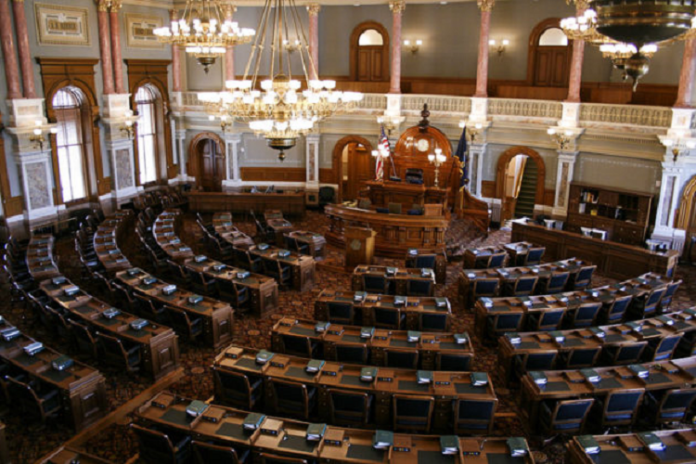The Kansas House on Wednesday approved legislation advocated by business groups that would give the Legislature oversight of the rules and regulations adopted by state agencies.
The bill, backed by the Kansas Chamber of Commerce, Kansas Grain and Feed Association and others, would clamp down on how regulations are adopted in Kansas.
It would require the Legislature to ratify rules if the anticipated compliance costs passed on to businesses, local governments or individuals exceed $1 million for the first five years of implementation.
The bill also would give the budget director the authority to reject regulations if an agency fails to submit a complete economic impact statement.
The bill, which passed 82-36, now goes to the Senate.
“All too often the people that make the rules and regulations don’t think it all the way through to the end to see what the final impact might be on businesses and how much it costs,” said Republican Rep. Sean Tarwater, chair of the House Commerce Committee.
“All this does is add an extra set of eyes to allow the budget director to make sure it was done correctly,” Tarwater said.
Under the current law, agency administrative rules that are projected to cost more than $1 million over two years must go to the budget director for approval.
After June 30 of this year, rules expected to cost $3 million covering a two-year period must go to the budget director for approval.
The law comes after voters in 2022 narrowly rejected a constitutional amendment that would have empowered the Legislature to veto rules and regulations.
The amendment was put on the ballot in an effort to rein in bureaucrats from writing policy into administrative rules and regulations.
Currently, the budget office and the attorney general’s office review proposed rules. They’re also reviewed by the Legislature’s Committee on Administrative Rules and Regulations.
The attorney general can – and has – stopped rules for legal reasons, but the legislative committee cannot block regulations proposed by an executive branch agency because they might be too burdensome on business, local government or individuals.
When Jeff Colyer was governor in 2018, he signed a bill into law that required state agencies to conduct economic impact studies to understand the fiscal impact of the rules and regulations that they promulgated.
Supporters of the bill said members of the joint committee on rules and regulations have voiced concern about incomplete economic impact statements, and there is no way to hold agencies accountable for the fallout of their regulations.
Lawmakers were presented with a copy of an economic impact statement submitted by the Department of Labor in 2021 dealing with workers’ compensation that lacked specificity or said its answers to questions were not applicable.
Supporters said the document reflected that many times, the submitted economic impact statements don’t show “any real dollar amount or data or analysis on who is going to be impacted and what it costs.”
Fiscal analysts reported that during 2023, five state agencies submitted five groups of rules and regulations with compliance costs of more than $1 million.
The agencies included the Department for Aging and Disability Services, the Department of Health and Environment, the Department of Transportation, the Board of Indigent Defense Services, and the Department of Wildlife and Parks.
Some Democrats saw the bill as an effort to get around the failure to pass the constitutional amendment on rules and regulations two years ago.
“They couldn’t get that constitutional amendment on rules and regs to pass,” Democratic state Rep. Stephanie Clayton of Overland Park said after the bill was heard in committee.
“Since the people wouldn’t vote for it, this is the next crack at it.”
















